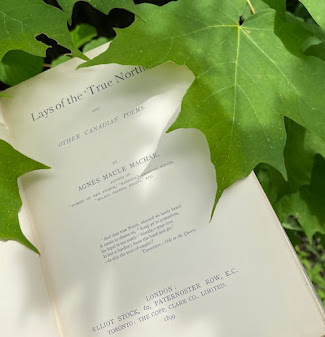Verse for the day, written for the country's very first day, by champion of Confederation Peter Steven Hamilton under his poetry nom de plume Pierce Steven Hamilton. This version closes the second sedition of his collection The Feast of St. Anne and Other Poems (Montreal: Lovell, 1890).
CANADA
Sound the note of rejoicing from trumpet and
horn;
For this day to the family of nations is born
Our Canada!
Let the thunders awaken to tell the old earth
How we joyously welcome this travail-less birth
Of Canada.
Let the bonfires blaze from the hill’s highest
crag,
And unfurl to the breeze the yet spotless young
flag
Of Canada;
While the people, exulting with shout and with
cheer,
Proclaim to the listening nations how dear
Is Canada!
Blessed child of a glorious parentage,
Born into the world in its brightest age,
No deluge of blood does thy young life immerse;
Nor stamped on thy brow is a mother’s curse:
All untrammeled thy limbs by the cankering
chains,
The harrowing toils and the numbing pains,
Which systems at war, in the gloom of the past,
Have over thy suffering sisterhood cast:
Thou art free as the wind o’er thy prairies that
blows,
And strong in the vigor that hourly grows;
No burden impedes thy triumphant career;—
All, all of thy Mother’s that thou mayest share,
Is the glory that brightens her history’s page.
Say: what wilt thou do with this heritage,
Oh, Canada?
Reposing there on thy Northern throne,
With thy free-born air, so proud and grand,
Thy bosom begirt with a golden zone,
And an ocean kissing thy either hand:
Is thy crown not already irradiated
By the beams from the sun of futurity shed!
May never that lofty and stainless brow
With the blush of shame in confusion bow,
Nor the voice of the future recall with scorn
The promise of this thy natal morn,
Fair Canada!
Wilt thou blazon forth on the scroll of time
A proud record of thoughts and of deeds sublime?
Be warned by—-but not to imitate—
The errors and crimes of a world effete
Shall the rule universal that governs thy land
Be, not the contrivance by impotence planned,—
A chaos of fiction, of error, deceit,
Where Anarchy’s smile is Society’s cheat;—
But the law, e’er evolving to infinite years,
And which lives in the music of numberless
spheres,
Developing ever what best is in man,
And ignoring the creed of Humanity’s ban;
Whilst. ever in Civilization’s advance,
In the vanguard shall quicken thy brightening glance,
Till the sorrowing nations their tumult shall
cease
To partake of thy glories of dignified peace,
Brave Canada?
Or foredoomed is that beauteous form to be
Of most loathsome of human things the prey,
Who, sneering at patriotism’s filial ties
And all things regarding with bestial eyes,
Would abase thee to grade of the prostitute,
And thy name, and thy fame, and thy honor
pollute?
Shall the reckless empiric and impudent fool
Presume o’er thy splendid Dominion to rule,
And punily wise whilst viciously daft,
Go aping old wiles of exploded state-craft,
In an endless procession, forever the same,
With “reform” but the change of a factionist
name?
Shall a verminly host of corruptionists crawl
O’er the face of thy loveliness, fouling it all,
Till their carcases, gorged with the tide of thy
life,
Make the stench of pollution where sweetness
was rife;
Whilst their poison, cast back in thy nurturing
pores,
Marks their trail centipedal with festering sores,
The spume of a leprosy raging beneath,
And making thy life one long, lingering death?
Shall the knave sanctimonious and smooth hypocrite,
All the while, on thy breast, like an incubus sit,
To mock thee with tales of the Heavenly Will,
And tell thee thy woes are inevitable;
Till the wise of thy children—most loved of thy
heart,—
Away from the sight of thy wretchedness start,
In despair at thy ruin, and blushing with shame
At the blight ignominious that clings to thy name,
Poor Canada?
Let our songs of rejoicing be toned with the
prayer,
That thy future may brighten a record more fair;—
For that prayer will re-act on the uttering Will,—
To uplift, to expand, and intensify still.
May thy sons, with due mete of their dignity
rise,
To wrestle, like men, with their destinies;
Put away childish things; self-reliant and bold,
Drawing lessons of truth from the lore of the old,
Yet seeking forever intensified light,
Rear thy empire proudly in wisdom and right;
And ever their glories ancestral advance,
With more than the splendors of England and
France;
Till thy banner of peace and of progress unfurled,
Shall blaze in the van of a happier world;
Whilst thy generate millions, through ages unborn,
Shall honor with pride thy Nativity Morn,
Dear Canada!
July 1st, 1967
Happy Canada Day!
Related posts:


































